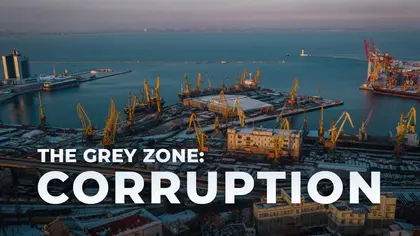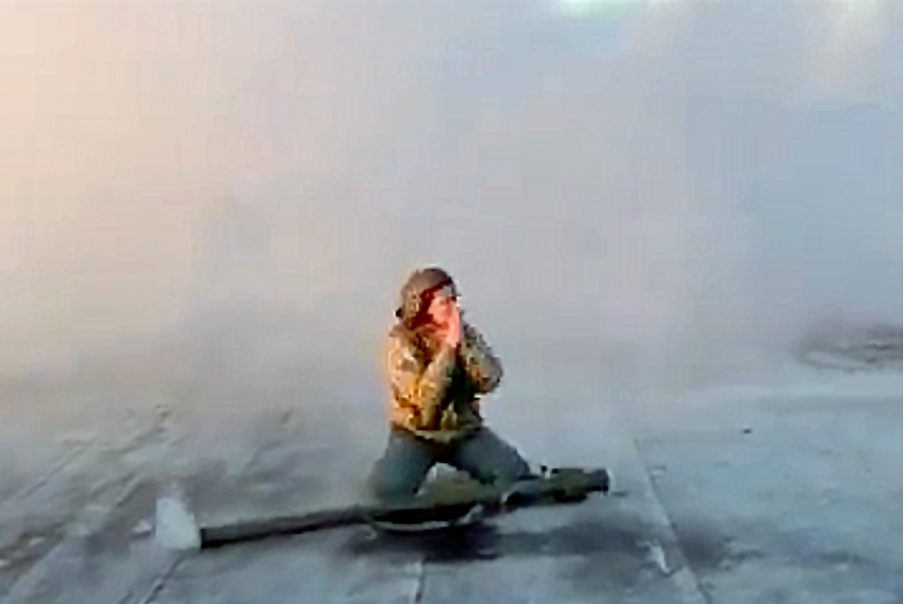Raids amid a barrage of rockets
Hours after a massive rocket barrage on Dec. 5, and with most of the city still in a state of blackout, officers of the National Anti-corruption Bureau of Ukraine (NABU) searched the offices of Odesa City Hall, seizing hundreds of legal and financial documents.
As Kyiv Post reported, NABU was pursuing suspects in a massive fraud and corruption case connected to the city hall. The surprise raid resulted in the arrests of two of the three most notorious figures who operate in the shadows behind the facade of the city’s mayor.
Boris Kaufman and Alexander Granovsky are both well-known for their opaque financial operations in Ukraine and Israel, as well as their vast political influence in the halls of power in Kyiv.
Under various governments, the two men enjoyed exclusive access to power, influence, and, allegedly, contraband.
“Good guys, bad guys — everyone in Odesa is shocked,” says Mark Hordienko, an Odesa activist known for his constant clashes with the local underworld.
“Kaufman and Granovsky were absolutely untouchable. You could tell even they thought this from their faces when they were arrested.”
According to Yuri Nikolov, an investigative journalist, and founder of the outlet Nashi Hroshi (Our Money), Kaufman and Granovsky were allegedly authorized by the president’s office to vet all major decisions relating to Odesa.
Nikolov told Kyiv Post: “Whether you want to privatize a house or get some land in Odesa, there is a formal vertical, at the top of which is Odesa’s mayor Genadiy Trukhanov.”

‘In Its Own Perverted Way, in Its Own Crooked World’ – Ukraine at War Update for Sept. 25
“And then there is the so-called back office controlled by Kaufman, and without this back office, not even a housefly can get through.”
But accusations of massive fraud and illicit access to the land resources in Ukraine’s second-richest city is only the tip of the iceberg.
“That is, in fact, about creating a structure parallel to the city hall. Connections with the president's office were a common secret,” Nikolov added.
“Kaufman is like a cockroach.”
The Russia connection
One of the most valuable assets belonging to this Odesa group is a company called “TEDIS” — a monopoly selling tobacco products in Ukraine.
It was previously known as “Megapolis” and was founded by Russian oligarch Igor Kesaev, who, as of 2014, also controlled 70 percent of the Russian market tobacco retail business.
The company once had control of 99 percent of the Ukrainian market, according to the Antimonopoly Committee of Ukraine (AMKU). Now its market share is still a monopoly, standing at about 75 percent.
The Russian monopoly, as well as its Ukrainian branch, were both controlled by Kesaev and his partner, both people with alleged ties to Russian main security agency, the FSB.
In Russia, Kesayev also took over a huge arms manufacturer, the Degtyaryov Plant, which produces machine guns under the Kalashnikov brand, as well as aircraft guns, anti-tank guns and rocket systems.
Ukrainian tobacco retailers flourished under Kesaev during the presidency of pro-Russian kleptocrat Viktor Yanukovych. Kesaev formally withdrew from the Ukrainian market two years after the Russian annexation of Crimea in 2014, leaving the huge business to his partner in Odesa – one Boris Kaufman.
But that’s not all.
The withdrawal of Russian arms and tobacco tycoons, according to Kyiv Post sources in Ukrainian law enforcement and the AMKU, was only a formal move.
“They (Kesaev and his partner in Russia) used crypto scams and also the mother of all dirty deals – cash – to keep on getting their share from the tobacco market,” says a retired law enforcement officer from Odesa, who was helping the Ukrainian regulators to dig into Kaufman businesses.
Gifts to a president
The only car that was allowed to park in front of the airport on the day when the then President Yanukovych visited the city for the first time in 2011 to meet the local elites was a huge Bentley.
Two people climbed out with a flurry of gifts for the president: boxes with Rolex watches were reportedly included among other gifts.
“Officially, according to the protocol, they were not allowed to enter the airport building. They were neither MPs nor governmental officials,” one of the former government employees who witnessed the scene told Kyiv Post.
“Everyone in the back office was surprised: Vitya [Viktor Yanukovych] was pretty tough about security. Yet they were still welcomed by the security. They brought the ’gift of respect’ to the leader,” the source added.
The two were Kaufman and Granovsky.
Hordienko adds: “They promised Yanukovych that they would finance the renovation of the runway. Later, they ended up getting billions in hryvnias of public funds to [do so].”
In the months to come, the two men would take over the airport, at least on paper. According to sources Kyiv Post spoke to, the real owner was Oleksandr Yanukovych – the son of the then-president, known in Ukraine under the nickname “the Dentist.”
The Odesa Nexus
After Kaufman and Granovsky took control of the airport, a firm called Duty Free Odesa began operating in the sphere the two men were now responsible for.
This firm, having the exclusive rights to trade there, was dealing with counterfeit Chinese cigarettes produced in Romania.
“Cheap whites,” the other name for Chinese counterfeit tobacco products, were found in Odesa seaport in a truck with no tax stamps on them. Small letters on the side of the pack read: “For Duty-Free Sale Only.”
The labels on the packaging on this cargo also weren’t in Ukrainian.
“Duty Free Odesa swore it had never before brought Chinese cigarettes into the country. That was untrue,” a joint investigation by OCCRP and Kyiv Post revealed in 2021.
Romanian export data shows that Duty Free Odesa imported 12.5 million counterfeit Chinese cigarettes into Ukraine in April 2017.
Two years before, a company with the same owner imported almost 15.5 million Chinese cigarettes.
According to Organized Crime and Corruption Reporting Project (OCCRP), the firm involved in cigarette contraband is co-owned by Vadym Sliusariev, a former major general of the Ukrainian border guards.
Later, Sliusariev became an MP with Volodymyr Zelensky’s Servant of the People party.
An investigation by Ukrainska Pravda revealed that Sliusariev fled to Russia in February, a week before the Russian invasion.
Cigarettes, smuggled into Ukraine were the brand manufactured by China National Tobacco Corporation, known as China Tobacco or CNTC. The Romanian plant is a part a Chinese state-owned company that produces nearly half of the world’s cigarettes.
“Whenever there is a Chinese business, we can safely assume it’s not private, but belongs to the Communist party,” says Artur Kharitonov, a Ukrainian analyst and blogger, who focuses on China.
With Russian and Chinese ties, the already flourishing business of tobacco smuggling became a real problem for the European community.
According to a pre-war study by KPMG, the budget losses of European Union (EU) countries due to cigarette smuggling cost the EU 12.5 billion euros per annum.
Poland, Belarus, and Ukraine have been at the top of the illegal exporters, providing the EU states with the market share of those imports of 13.2 percent, 10.1 percent and 6.9 percent respectively.
Traditionally, some officers of the border guards, police and the State Security Service of Ukraine (SBU) were involved in cigarette trafficking through the porous Western border – one of the main sources for counterfeit tobacco products in the EU. It had resulted in a skirmish on the Ukrainian-Hungarian border back in 2015 when people from different smuggling groups and their cronies in law enforcement agencies were involved in a gun fight.
This time it was something different.
The Chinese tobacco brand “Regina”, produced in Romania, headed to the Odesa port either for sale on the Ukrainian market or for further re-export.
“Russian elements still involved”
Kaufman and his people were known for connections with most of Ukraine’s presidential administrations since the early 2000s.
“I know that Russian criminal groups are still into this tobacco retail business” claims Hordienko.
“Although Kesaev’s people are not formally present on the board of the company, they are in control of the processes there,” one of the law enforcement officers, speaking on condition of anonymity, told Kyiv Post.
The former AMCU executive, as well as the officer running the investigation of Odesa smuggling schemes, confirmed this to Kyiv Post.
Kyiv Post has sent a request to NABU on the alleged role of Russian entrepreneur Kesaev in the business of monopoly tobacco distributor, “TEDIS.”
Gizo Uglava, now the acting head of NABU, declined to comment, forwarding it to NABU’s press office. The latter had not responded as of the time of this publication.
In short, the strike against corruption in Odesa appears to have detonated a process which may well produce a chain reaction. The question is whether it has opened Pandora’s box or simply a can of worms.
You can also highlight the text and press Ctrl + Enter






